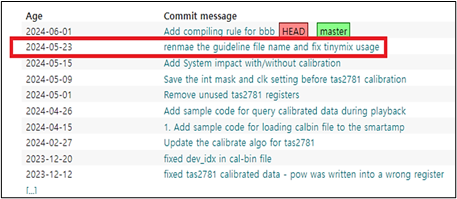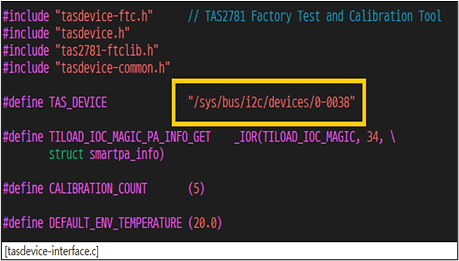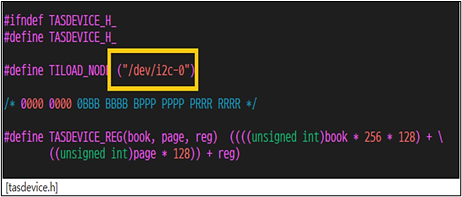Other Parts Discussed in Thread: PP-SALB2-EVM
Tool/software:
Hi,
I am considering using TAS2781 in a new project. I have two projects using the same board,
one with a speaker and the other without a speaker. I have the following problems.
1) TAS2781_0x38_cal.bin error
I found that the Linux Driver requests tas2781_cal_0x38.bin file
if I make a bin file using PPC3 in tuning mode, not in ROM mode.
If the tas2781_cal_0x38.bin bin file does not exist, then error occurs and the default data is applied.
As a result, the TAS2781 output only 0.4W/8Ω when I play 0dBFS 1kHz signal.
|
[ 2.398839] tas2781-codec 0-0038: Direct firmware load for tas2781_cal_0x38.bin failed with error -2 [ 2.409132] tas2781-codec 0-0038: tas2781_load_calibration: Request firmware tas2781_cal_0x38.bin failed [ 2.419796] tas2781-cedec 0-0038: tasdevice_fw_ready: load tas2781_cal_0x38.bin error, default will effect |
How can I make the tas2781_cal_0x38.bin file?
2) Characterization issue
Re, Sd, Fs, Qts, Vas, Qms, Qes, BL, Cms, Mms, Rms, Le, Excursion Limit values were obtained
from the specification of the speaker unit, but L2, Ke, Rtv, Ctv, Rtm, Ctm, Rtva, Temperature Coefficient,
Integral Gain 1, Integral Gain 2, and Proportional Gain values could not be obtained.
How should I enter these values, and do they have a significant impact on the amplifier output?
The speaker I am using is 10W/8ohm.
3) Is it possible to get normal output with just the Characterization value
without loading the Calibration value? What is the role of the Calibration ?
4) If the amplifier outputs 12W/8ohm @1kHz then i can check the other aspects
such as power supply and noise, etc. Correct tuning of the speaker can be done with time.
So, can I get a Characterization file and a Calibration file for test that can outputs 12W/8ohm @1kHz?
5) For the project that do not include a speaker, I need to use EQ and DRC function
and disable Characterization and Calibration function. How can I disable these functions?





